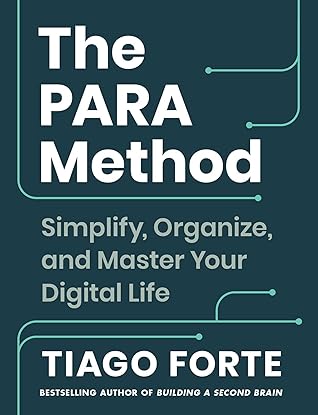More on this book
Community
Kindle Notes & Highlights
by
Tiago Forte
Started reading
October 2, 2025
How to Read This Book
Every word in this book is designed to do one thing: propel you forward into taking action.
Part 1. I strongly recommend you stop there and try implementing PARA for yourself,
Part 2 contains additional guidelines and best practices
Part 3 contains “deep dives” on more advanced topics that my collaborators, clients, and students have found helpful, such as how to formulate a project list, how to adopt habits to stay organized, and how to use PARA to enhance your focus, among others. These chapters can be read as needed when you find yourself hungry
PROMISE #1:
Look at the original list above again. None of the items on it will end or change—that’s the definition of an area of responsibility, that it continues indefinitely. Now imagine the psychological effect of waking up week after week, month after month, and even year after year to the exact same list of never-ending responsibilities. No matter how hard you work, the endless horizon never seems to get any closer.
Getting Organized for the Life You Want to Lead Using PARA is not just about creating a bunch of folders to put things in. It is about identifying the structure of your work and life—what you are committed to, what you want to change, and where you want to go. It is about organizing information in such a way that it supports and calls into being the future life you want to lead. So much of what we call “organizing” is essentially procrastination in disguise. We tell ourselves we’re “getting ready” or “doing research,” pretending like that means progress.
Here’s what I want you to do: select all the existing files, documents, folders, notes, etc. in your Documents folder (which may number in the hundreds or even thousands or more) and move them all at once into a new folder called “Archive [Today’s date].”
up folder #2, Areas, when you want to think longer term. Folders #3 and #4, Resources and Archives, can remain safely out of sight until you need them. TIP #3: Use a Naming Convention It’s helpful if you can see a folder—on any platform, on any device—and instantly know which of the four main PARA categories it is in. I like to use an informal naming convention to make this possible, such as: Emojis at the beginning of titles for project folders Capitalized titles for area folders Uncapitalized titles for resource folders For example, these are immediately recognizable as projects (because
...more
Anything you might need to reference or remember in order to effectively play these roles is worth noting down.


